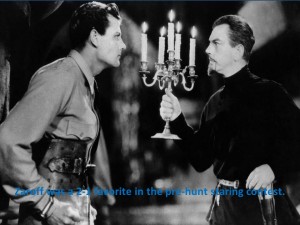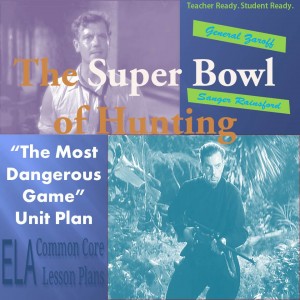
If you’re looking for lesson plans for “The Most Dangerous Game” click the pic. You can also find a lesson plan for watching “The Most Dangerous Game” movie. The lesson’s good. The movie’s so bad that it’s good.
I’m just going to give you the lesson plan before you start reading: “The Most Dangerous Game”: The Super Bowl of Hunting
This doesn’t have to be a “Most Dangerous Game” essay lesson plan. It can be “Most Dangerous Game” analysis lesson plan or simply a “Most Dangerous Game” discussion lesson plan. It’s up to you.
Now that I think about it, it’s actually a brilliant lesson for discussing conflict in literature.
Who do you think will win the Super Bowl?
With the big game coming up, we’re all waiting to see which team claims the title of world champion. (My Vegas instincts tell me New England minus -1.5.)
But an even more colossal matchup took place many years ago on an island in the Caribbean.
Welcome to Ship-Trap Island and the Super Bowl of Hunting.
Hey, I put the lesson plan link at the top of this post. I have more lesson ideas for “The Most Dangerous Game.” I love this story! Feel free to use my notes to introduce the lesson and review the lesson with your class.
Our first contestant is General Zaroff. General Zaroff began hunting at a young age, killing his father’s prize turkeys, some unfortunate sparrows who wandered on to the Zaroff estate, and a bear.
In addition to having hunted every animal on the planet, he has read every book ever written on the subject, including the one Rainsford wrote about hunting Snow Leopards in Tibet.
His opponent is Sanger Rainsford. Rainsford isn’t like one of those Internet blogger types who writes a travel blog about places he’s never been to (I’ve actually done that) or lesson plans about lessons he’s never taught from people who aren’t actually teachers (as a side note, I am a teacher and have been for over 18 years–I’ve taught this lesson before and will do it again on Friday). He’s actually hunted snow leopards in Tibet, cape buffalo, jaguars and just about every other animal that would rip you and I to shreds for merely farting in the general vicinity of its lair.
If he’s to have any chance in this contest, he better have more hunting skills than he has balancing while smoking a pipe skills. Rainsford ends up in the Super Bowl of Hunting by an accidental fall off a yacht and a survival swim in the middle of a Caribbean night.

Zaroff is a heavy favorite in this contest. He’s got home-island advantage, experience in hunting humans, a giant assistant, a pack of dogs, and a gun. Oh, and every night he can return to his home, eat a nice meal, and get a good night’s rest.
After closer examination, no wonder Zaroff wins all the time. That’s like the New England Patriots playing the Super Bowl in Boston with referees from Connecticut and three extra players on the field at all times while using an under-inflated football (had to go there, didn’t I?) while the Rams players are forced to sleep in a homeless shelter the three nights leading up to the game (in which case, you should definitely lay the 1.5 points).
Sanger Rainsford’s Strength and Advantages. Rainsford’s resourcefulness and levelheadedness certainly help him maintain his composure while under extreme stress. He finds himself under extreme stress for practically the entire hunt.
That tends to happen when you bring a knife to a gun fight, literally.
Although his resourcefulness eventually pays off , he would have been dead on day 1 if not for Zaroff’s boredom. In the end, Rainsford wants to live. Zaroff does not.
The Lesson Learned
- A lack of focus and determination can lead to one’s downfall even when advantages are superior.
- Never give up! That’s an obvious cliche, but it saves Rainsford.
- Don’t rely on things outside of you for happiness. That’s another cliche, but if Zaroff hadn’t relied on hunting for his sole source of happiness then he would have been content not hunting humans and would not have become depressed when he realizes even world-renowned hunters are easy to track down (especially if you have a gun, an assistant, home island advantage, and a pack of dogs).
Here’s my final conclusion on the Super Bowl of Hunting.
Zaroff wants to die–at least on a subconscious level. In addition to the many hints Zaroff gives about hunting no longer being enjoyable, he lets Rainsford off the hook several times. And although he was ready to kill Rainsford during their last encounter, he becomes negligent and careless.
I offer you this, fellow English teacher and scholar of literature: As you and your students were reading “The Most Dangerous Game,” did it not occur to you that perhaps Rainsford survives the plunge into the sea? Would it not, therefore, occur to the world’s greatest hunter of humans that Rainsford survives his plunge into the sea?
Zaroff is not upset that he loses. He’s upset that he wins so easily, which to him is the ultimate loss. (Drop the mic!)
This comparison assignment/activity/discussion covers the following Common Core objectives.
- RL.9-10.1 Cite strong and thorough textual evidence to support analysis of what the text says explicitly as well as inferences drawn from the text.
- RL.9-10.2 Determine a theme or central idea of a text and analyze in detail its development over the course of the text, including how it emerges and is shaped and refined by specific details; provide an objective summary of the text.
- RL.9-10.3 Analyze how complex characters (e.g., those with multiple or conflicting motivations) develop over the course of a text, interact with other characters, and advance the plot or develop the theme.
If you decide to make it an essay assignment, you could cover these (and many more).
- Common Core Writing Standard 1. Write arguments to support claims in an analysis of substantive topics or texts, using valid reasoning and relevant and sufficient evidence.
- Common Core Writing Standard 2. Write informative/explanatory texts to examine and convey complex ideas, concepts, and information clearly and accurately through the effective selection, organization, and analysis of content.
- W.9-10.4 Produce clear and coherent writing in which the development, organization, and style are appropriate to task, purpose, and audience. (Grade-specific expectations for writing types are defined in W.9-10.1-3.)
- W.9-10.5 Develop and strengthen writing as needed by planning, revising, editing, rewriting, or trying a new approach, focusing on addressing what is most significant for a specific purpose and audience. (Editing for conventions should demonstrate command of L.9-10.1-3.)
- W.9-10.9a Apply grades 9-10 Reading standards to literature (e.g., “Analyze how an author draws on and transforms source material in a specific work [e.g., how Shakespeare treats a theme or topic from Ovid or the Bible or how a later author draws on a play by Shakespeare]”).
Last Updated on January 25, 2019 by Trenton Lorcher
Share This:

